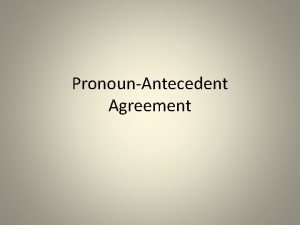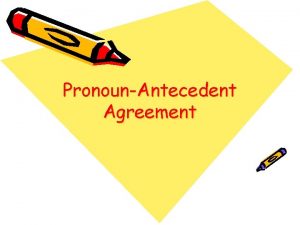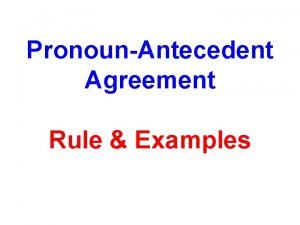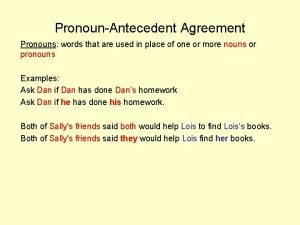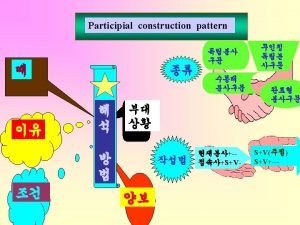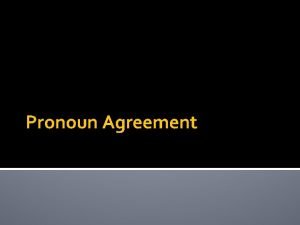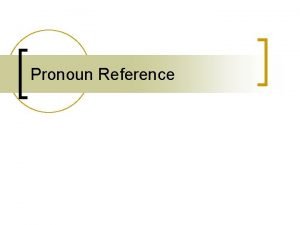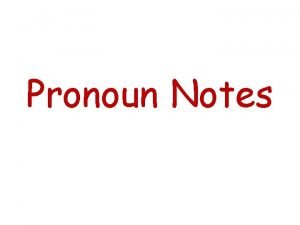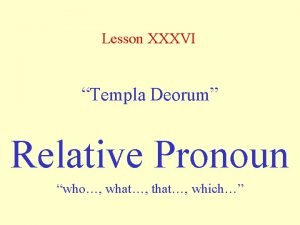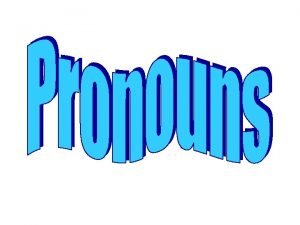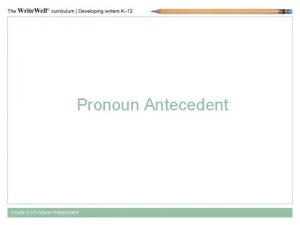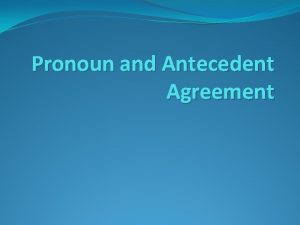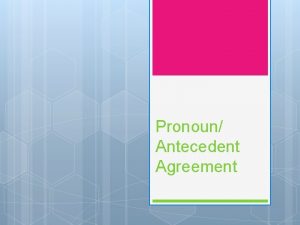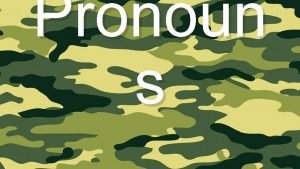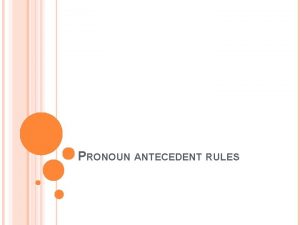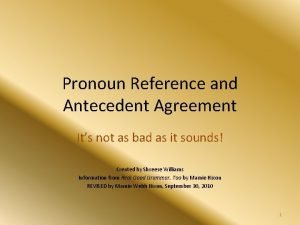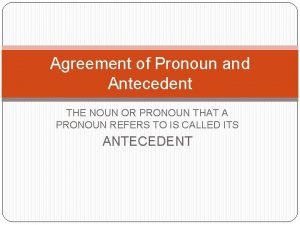Pronoun Antecedent Agreement Writing in the Disciplines WID















- Slides: 15

Pronoun – Antecedent Agreement Writing in the Disciplines (WID) G. Griggs & B. Morales 1

What is Pronoun. Antecedent Agreement? Pronouns substitute nouns. Many pronouns have antecedents, nouns or pronouns to which they refer. A pronoun must always agree with its antecedent in number, whether singular or plural. Medical students must study hard if they want to succeed. (antecedent) (pronoun) Possessive pronouns used before nouns function as adjectives Dr. González finished her rounds in the hospital. (antecedent) (possessive pronoun) 2

Personal and Possessive Pronouns Subject Object Possessive (used before a noun) I You He She It We You They Me You Him Her It Us You Them My Your His Her Its Our Your Their Possessive Pronoun Mine Yours His Hers Its Ours Yours Theirs 3

Practice: Personal & Possessive Pronouns 1. My friend gave (me, my, mine) a present. 2. It was (me, my, mine) favorite gift. 3. The gift is (me, my, mine) to keep. 4. You should check (you, yours) tire pressure. 5. The book was (you, yours) recent purchase. 6. It is not (me, my, mine), it is (you, yours). 7. (She, Hers) told (he, him, his) to be careful. 8. (He, Him, His) spilled (he, him, his) coffee. 9. Magda left her phone at (she, hers) house. 10. She went back to pick (it, its) up. 11. The boys rode (they, them, theirs) bicycles and left (they, them, theirs) on the lawn. 4

Indefinite Singular Pronouns Indefinite singular pronouns refer to nonspecific persons or things For indefinite singular pronouns, use “he or she” or “his or her” to avoid sexist language or change the antecedent to plural INDEFINITE SINGULAR PRONOUNS Anybody Each Everyone Nobody Somebody Anyone Either Everything No one Someone Neither Nothing Something Anything Everybody 5

Practice: Change Pronoun-antecedent agreement to plural 1. Everyone should see his or her doctor regularly. All people should see their doctors regularly. 2. An engineer often assists his or her colleagues on large projects. Engineers often assist their colleagues on large projects. 3. No one knows his or her way to El Yunque. None of us know our way to El Yunque. 4. A student who gets good grades usually does his or her work well. Students who get good grades usually do their work well. 6

Indefinite Pronouns Joined by “And”, “Neither -Nor, ” “Either-Or” Compound subjects (more than one subject) joined by and always use plural pronouns Debra and Rafi chose their teammates. Compound subjects joined by neither – nor and either -or agree with the antecedent closest to the pronoun Neither Debra nor Rafi did his or her homework. Neither the pilot nor the employees gave their opinions. Either Pedro or Sam will do his homework. Either Pedro or the girls will do their homework. 7

Practice: Indefinite Singular Pronouns 1. Somebody left (he or she; his or her; its; they; their) 2. 3. 4. 5. 6. shoes on the beach. I told everyone to take (he or she; his or her; its; they; their) books to class. If anybody wants to get a job, (he or she; his or her; its; they; them) must study. No one wanted to give up (he or she; his or her; its; they; their; them) seat on the bus. There was something on the ground and (it, its, their, them) was green. Neither Carmen nor her friends ate (he or she; his or her; its; they; their; them) lunch. 8

Indefinite Singular or Plural Pronouns PLURAL SINGULAR OR PLURAL (depends on the noun it represents) Both Few Many Several All Any Either None Some More Most of my dogs ate their food quickly. Some of the students finished their homework. The cake was on the plate, and some of it was eaten. All of the us rode our bicycles to the park. Did any of the boys lose his bicycle at school? 9

Collective Nouns Collective nouns name a class or a group and are usually singular. COLLECTIVE NOUNS Audience Band Dozen Family Jury Kind Number Pair Class Couple Committee Crowd Flock Group Heap Herd Litter Lot Majority Minority Public Staff Team Tribe 10

Collective Nouns COLLECTIVE NOUNS Collective nouns may be plural if its members function as individuals. Audience Band Class Couple Committee Crowd Dozen Family Flock Group Heap Herd Jury Kind Litter Lot Majority Minority Number Pair Public Staff Team Tribe SINGULAR PLURAL The jury reached its decision. The jury put their signatures on the document. The army sent its soldiers overseas. The team scored its first homerun. The public gave their opinions. The team [members] got into their cars. 11

Practice 1. 2. 3. 4. 5. 6. 7. 8. 9. 10. Did either of the girls take (her, their) book bag? Both of the boys lost (his, their) baseballs. Students argued that (his or her, their) ideas were correct. The apples are there, and none of (it, them) have been eaten. Neither Frank nor his children shared (his or her, their) food. The committee left the meeting and returned to (his or her, their) offices. Each of us should determine (his or her, our, their) decision. All athletes must practice regularly if (he or she, they) want to improve. Either Rebecca or Cassandra should receive a prize for (her, their) poem. Jorge lent his bike to someone who allowed (his or her, their) friend to use it. 12

Pronoun-Antecedent Suggestions 1. All pronouns have antecedents, which refer to person(s) or object(s) that are previously mentioned in the text. 2. Singular antecedents use singular pronouns. 3. Plural antecedents use plural pronouns. 4. Avoid sexist language; instead, use gender-neutral & plural antecedents (persons, individuals, students, people, human beings, postal workers, coordinators). 5. The gender of a pronoun must match its antecedent: Diana waited for her husband. 13

Pronoun-Antecedent Suggestions 6. Most indefinite pronouns are singular. 7. Generic nouns (doctor, student, writer, member, person) represent both males and females. --A college student has his or her own point of view. 8. Change generic nouns to plural to fix agreement problems. -- College students have their own points of view. 9. Collective nouns are usually singular unless the people in the collective group act as individuals. 10. If you’re not sure, look it up! 14

Images courtesy of the following Web sites Bull’s eye– http: //www. swotti. com/tmp/swotti/cache. YNVSBHNLEWU=/img. Bullseye 1. jpg Hen with chickens- http: //www. clker. com/clipart-hen-with-three-chicks. html Thumbs up- http: //www. pixmac. com/picture/thumbs+up+success+hand+sign/000042065839 15
 Pronoun-antecedent
Pronoun-antecedent Hisself vs himself
Hisself vs himself Pronoun-antecedent agreement examples
Pronoun-antecedent agreement examples What are some antecedents
What are some antecedents Blackboard login
Blackboard login Who which that
Who which that What is the basic principle of pronoun antecedent agreement
What is the basic principle of pronoun antecedent agreement Pronoun and antecedent
Pronoun and antecedent Define pronoun antecedent
Define pronoun antecedent Pronoun-antecedent
Pronoun-antecedent What is the basic principle of pronoun antecedent agreement
What is the basic principle of pronoun antecedent agreement Persons in english
Persons in english Pronouns and their antecedents must agree in
Pronouns and their antecedents must agree in Whats a intensive pronoun
Whats a intensive pronoun Relative pronoun antecedent
Relative pronoun antecedent Pronoun jeopardy
Pronoun jeopardy

